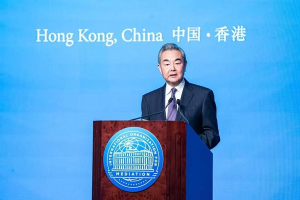
It is certain that in the aftermath of the effectuation of the macroeconomic reform, a broad range of sectors has set in motion reaping the fruits of attainments in stages and drop by drop.
The federal government’s undertakings to tackle vital encounters revolving around the economy of the country has in the present climate jump-started getting back to the right track and heading in the right track in the face of hiccups.
Notwithstanding the fact that the intended target is being achieved on account of the macroeconomic reform, certain segments that have an aversion to see Ethiopia’s growth have been making an effort to smudge the promising strides.
However, no matter what happened and who said what, Ethiopia has been heading in the right direction proving naysayers wrong and throwing a wet blanket on their barefaced lies.
As the group does not want to witness the positive strides of the country, it has been involved in distorting facts and bamboozling the wider international community.
Subsequent to the ongoing macroeconomic reform policy, the country has been plunged into smoothing the path of its foreign currency reserves and foreign reserve assets which signals the positive outcomes and progress.
In the present circumstances, positive achievements have been registered in numerous sectors such as mining, manufacturing, tourism, agriculture and other things of a similar kind.
Ethiopia’s home-grown economic and macroeconomic reforms have fostered a supportive environment for Small and Medium Enterprises (SMEs), according to the Ethiopian Intellectual Property Authority (EIPA).
EIPA, in collaboration with the World Intellectual Property Organization (WIPO) and the Japan Patent Office (JPO), held a national intellectual property workshop in the recent past to increase SMEs’ awareness of innovation management and the importance of intellectual property (IP).
EIPA Director-General Woldu Yimesil highlighted that these economic reforms have been paving the way for SMEs to play a more active role in Ethiopia’s economic growth, although their current contribution to the GDP remains modest.
“SMEs need to focus on building intangible assets, especially intellectual property, which is essential for enhancing competitiveness, increasing product value, creating jobs, and addressing financial hurdles,” he said. The reforms, Woldu added, present SMEs with new opportunities to contribute to Ethiopia’s development.
The workshop aimed to boost awareness and create a forum for discussing SME-related agendas and sharing experiences. Woldu pointed out that many developed countries, such as Japan, Taiwan, and South Korea, have grown their economies through strong SME sectors, with SMEs making substantial contributions to GDP and job creation. It is widely acknowledged that Ethiopia’s macroeconomic reform plays a paramount role in opening up new market opportunities for the country by attracting both domestic as well as worldwide financers.
In addition to that the newly implemented macroeconomic reform has been bringing about widespread stable economic growth across the nation.
If the whole thing keeps going in this way, the whole kit and caboodle through the passage of time will fully end up getting back on the right track playing a vital role in abolishing obstacles to trade, fashioning new commercial opportunities, improving competitive capacity and more of the same.
It is obvious that enhanced prospects, foreign reserves, and other various things will give the green light to better influence government-backed initiatives with success.
In light of the current situation, most people from all sections of the society have been certifying the encouraging moves and positive achievements of the macroeconomic reform implementation.
It is true that the federal government has allocated noteworthy possessions to alleviate the influence of improvements on populations for the most part through subsidizations for vital goods such as medicines, fertilizers and what have you.
The MoPD Development Planning and Government Investment Administration Lead Executive Officer Bereket Fisehatsion recently told The Ethiopian Press Agency (EPA) that the comprehensive macroeconomic reform would have a range of contributions such as increasing productivity, substituting imports, overcoming debt burden, improving foreign exchange earnings and so on.
Over the past years, the country has been undertaking various short and long term economic reforms, which include the ten-year development plan, homegrown economic reform and macroeconomic reform agendas, he mentioned.
The floating foreign exchange rate system is one of the macroeconomic reform agendas that the country lately introduced to overcome economic challenges, he said.
This system would address country’s structural economic problems, contributing to allocate resources in effective sectors, overcoming macroeconomic distortions, ensuring sustainable economic growth and its competitiveness, minimizing debt, ensuring fair and effective distribution of foreign exchange in successful sectors, encouraging production and productivity, correcting foreign exchange rate and others, he added.
Moreover, it has a huge contribution to attracting FDI, substituting import, balancing trade deficit and debt structuring among others. In the long run, the new system would reduce debt to GDP ratio and it leads to increase export and revenue, he noted.
The fundamentals of this reform is getting the price right. If there is a right price in the country, the lenders would release extra finance to mobilize development finance. As a result, country’s debt servicing would be significantly improved.
In actual fact, the current macroeconomic reform is directly related with the previous economic reforms and one of the reform measures that planned in the second homegrown economic reform agendas. There would be community sectors that might be impacted following the reform so that the government is working on safety net, subsidization and others legal measures to address these challenges.
At this moment in time, following the implementation of macroeconomic reform, the Ethiopian Diasporas has kicked started showing interest to invest in their motherland and take the country to the next level of accomplishment at the earliest possible juncture.
It is learnt that Ethiopia’s recent commitments to implementing comprehensive macroeconomic reform policies aims to correct foreign exchange distortions, address the structural balance of payments deficit, and reduce inflation by modernizing the monetary policy framework. These reforms are designed to create a favorable balance to meet national development needs by increasing domestic income and addressing debt vulnerability.
Additionally, the reforms focus on enhancing the inclusiveness, competitiveness, and resilience of the financial sector. By improving government service delivery, addressing climate change, and ensuring food sovereignty, the reforms seek to build a robust, inclusive, and sustainable economic system.
Manufacturer Industry Development Institute has confirmed that Ethiopia’s recent macroeconomic reform is playing a significant role in stimulating inclusive economic activities, particularly export performance and import substitution.
Ethiopia has embarked on full implementation of macroeconomic reform to enable the country achieve high and stable economic growth, maintain single-digit inflation, and build a globally competitive economic system.
The full implementation of the policy is expected to establish the prosperity of the nation on firm foundation.
Experts have been showing strong optimism that Ethiopia is in the right track in its effort to enhance the overall economy through the implementation of the reform.
In his exclusive interview with ENA, the Deputy Director General of the Manufacturer Industry Development Institute, Hadgu Haile Kiros emphasized that comparing to the same period last year; exports have surged by a staggering 84 percent.
Import substitution has also seen positive growth, with a 1.3 percent decrease in imported goods during the first quarter compared to the previous year. He attributed this success to the “Made in Ethiopia” initiative, which has raised public awareness and encouraged the use of locally produced goods.
A well-designed import substitution strategy is being implemented, leading to the complete replacement of imported items like furniture with locally manufactured products.
The country’s all-embracing reforms have kicked off attaining considerable results and remarkable successes in breathing new life into boosting nation’s economic growth in a permanent manner.
Nowadays, Ethiopia has commenced putting in place wide-ranging macroeconomic reforms with the purpose of attaining robust economic growth, continued economic growth, and what have you.
It is a well-known fact that the reform procedures put a high value on a diversity of matters encompassing macroeconomic stability, general price stability, bolstering the economic sector and whatnot. Reasoning from this fact, the results have been observed in various development activities of the country.
The ongoing economic reform in black and white demonstrates the fact that the country’s economic growth is going in the proper direction. If all pertinent bodies keep on going in this way, the country’s economy in the shortest possible will accomplish the desired goal.
Ethiopia has been effectuating an all-inclusive macroeconomic reform to oil the wheels of its competitive capacity in terms of business and investment sectors, reinforce indigenous production and other things of a similar kind.
The employment of macroeconomic reform has begun producing outstanding results in various sectors all over the country paving the way for the country’s development activities.
BY ADDISALEM MULAT
THE ETHIOPIAN HERALD SATURDAY 30 NOVEMBER 2024




